Personal Reference Letters: Building Your Success through Powerful Recommendations and 18 Templates
Welcome to “Personal Reference Letters” – your one-stop destination for crafting impactful reference letters. Whether you’re job hunting, applying for scholarships, or facing important personal matters, we’re here to equip you with the tools and knowledge needed to create persuasive letters that make a difference. With expert tips, valuable resources, and personalized services, we empower you to navigate the world with confidence. Get ready to unlock new opportunities and elevate your prospects. Join us at “Personal Reference Letters” and let’s embark on this journey together!
Customized Personal Reference Letter Services
At our customized Personal Reference Letter services, we understand the importance of a well-crafted reference letter that truly reflects your unique qualities and meets the specific requirements of your situation. We offer personalized services where visitors can request custom-written tailored to their individual needs. Our process is simple and efficient – you provide us with the necessary information, such as your background, accomplishments, and the purpose of the letter. Our experienced writers will then carefully craft a personalized that highlights your strengths, achievements, and qualifications.
Our pricing is competitive and based on the complexity and length of the reference letter. We believe in transparency, so you will receive a clear pricing structure before making any commitments. Our goal is to add value to your writing experience by providing professional expertise and ensuring that your letter stands out from the rest.
How to Write an Effective Personal Reference Letter
- Introduction and Relationship: Start by introducing yourself and your relationship with the person you are writing the reference letter for. Clearly state how long you have known them and in what capacity (e.g., as a colleague, supervisor, friend, etc.).
- Purpose and Context: Explain the purpose of the reference and provide context. Mention the specific opportunity, such as a job application, college admission, or rental application, for which the letter is being written. Briefly describe why the person is seeking your recommendation.
- Identify Key Qualities: Identify and highlight the key qualities, skills, and attributes of the person that are relevant to the purpose. Consider their character, work ethic, achievements, and any specific experiences that showcase their abilities.
- Provide Specific Examples: Support your claims about the person’s qualities with specific examples. Share anecdotes or instances where you witnessed their skills or observed their positive attributes in action. These examples should demonstrate the person’s strengths and reinforce your assessment of their abilities.
- Be Objective and Honest: While it’s important to showcase the person’s strengths, it’s equally important, to be honest and objective. Provide a balanced perspective and avoid exaggeration or false information. Authenticity and credibility are crucial in a reference letter.
- Structure the Letter: Organize the letter in a logical manner. Consider using paragraphs to address different qualities or aspects of the person’s character. Start with a strong opening paragraph to grab the reader’s attention and end with a conclusive paragraph summarizing your overall recommendation.
- Use Professional and Positive Tone: Maintain a professional and positive tone throughout the letter. Choose your words carefully to convey your endorsement and enthusiasm for the person. Avoid any negative or derogatory language.
- Proofread and Edit: Before finalizing, carefully proofread it for any grammatical or spelling errors. Ensure the letter flows smoothly and is easy to read. Pay attention to the overall structure and coherence of your thoughts.
- Include Contact Information: Include your contact information at the end of the letter so that the recipient can reach out to you for further clarification if needed. This adds credibility to your recommendation.
- Sign and Date: Print out the letter, sign it by hand, and include the date. This adds a personal touch and shows that you have taken the time and effort to write a thoughtful reference.
#1: Character Reference Letter:
A Character Reference Letter serves as a valuable tool to vouch for someone’s personal character, integrity, and moral values. It is typically written by someone who knows the individual well, such as a friend, colleague, or community member. It aims to support the individual in various contexts, such as employment applications, volunteer opportunities, or legal proceedings, by giving a credible account of their character and attesting to their trustworthiness and upstanding nature. A well-crafted Character can help prospective employers, organizations, or legal entities gain a deeper understanding of the person’s integrity and overall suitability for a particular role or responsibility.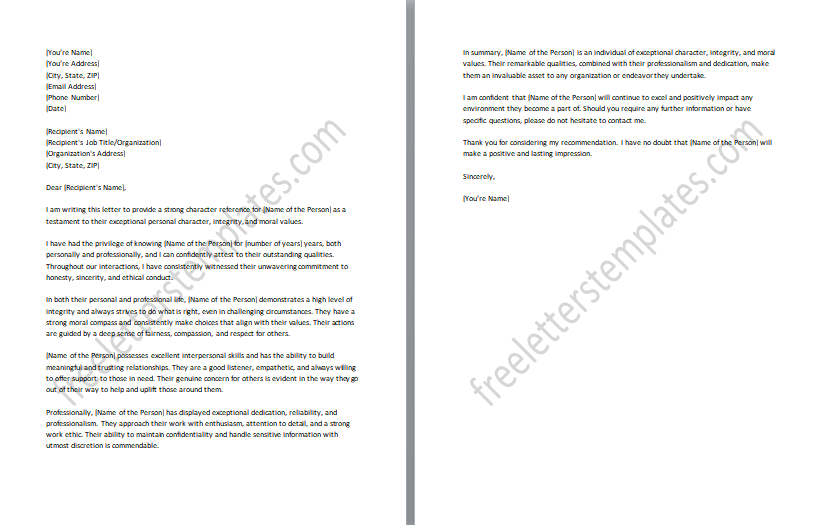
#2: Employment Reference Letter:
An Employment Reference Letter is a powerful tool used to endorse an individual’s skills, work ethic, and suitability for a job. This is typically written by a previous employer or supervisor who has had direct experience working with the individual. Employment plays a crucial role in the hiring process as it helps potential employers gain a comprehensive understanding of the candidate’s past performance, reliability, and compatibility with the job requirements. It serves as a trusted testimonial that validates the candidate’s qualifications, work history, and professional demeanor, ultimately aiding in their pursuit of new employment opportunities. A well-crafted Employment can significantly enhance the candidate’s chances of securing a desirable position and advancing in their career.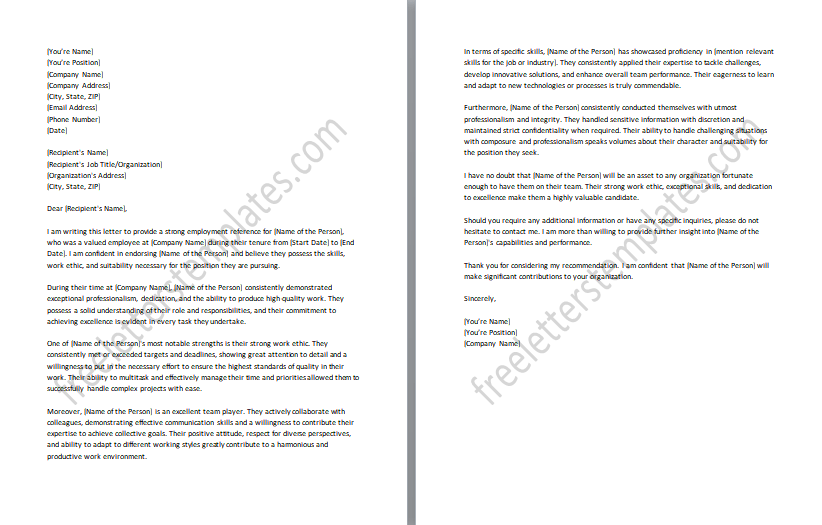
#3: Academic Reference Letter:
An Academic Reference Letter holds great importance as it offers a comprehensive evaluation of a student’s academic journey, achievements, and future potential. Through this, the writer sheds light on the student’s intellectual prowess, critical thinking abilities, and unwavering commitment to their studies. It provides admission committees and scholarship providers with valuable insights into the student’s qualifications and capacity to excel. The Academic acts as a key element in shaping the perception of the student’s academic prowess and readiness for future academic endeavors.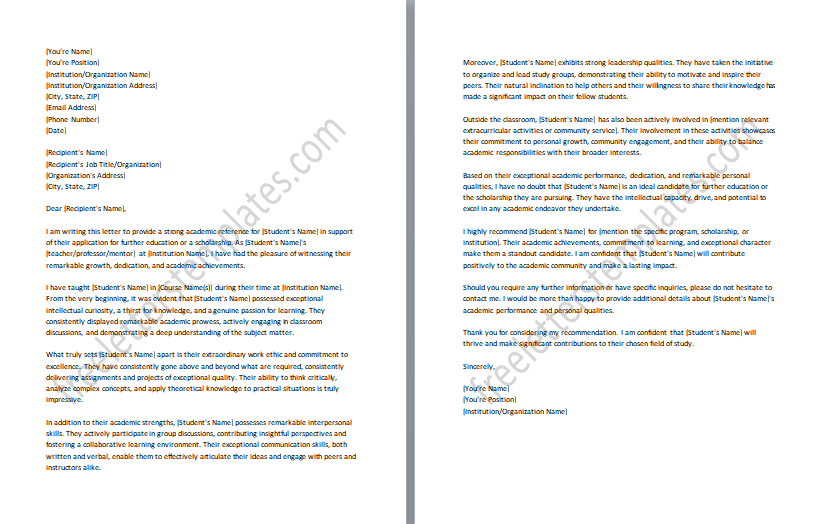
#4: Volunteer Reference Letter:
A Volunteer Reference Letter holds great significance as it provides a comprehensive assessment of an individual’s commitment, reliability, and contributions as a volunteer. Typically written by a supervisor or organization representative, this highlights the volunteer’s dedication, work ethic, and impact on the organization or community. It showcases their ability to take initiative, work well in a team, and demonstrate a strong sense of responsibility. The Volunteer serves as a valuable endorsement, offering insights into the volunteer’s character and the valuable skills they have gained through their service. It plays a pivotal role in supporting the volunteer in future volunteer positions, scholarships, or employment opportunities by showcasing their credibility and commitment to making a meaningful impact.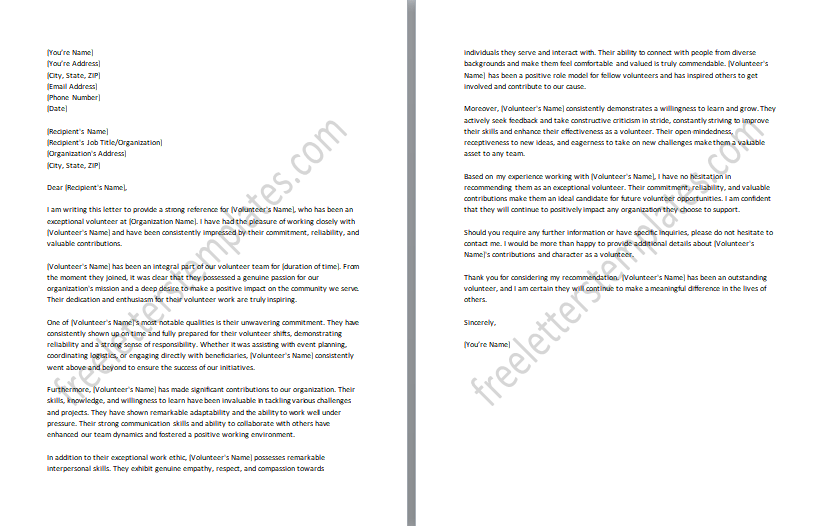
#5: College Admission Reference Letter:
A College Admission Reference Letter carries immense weight as it paints a comprehensive picture of a student’s qualifications, achievements, and potential for success in higher education. Usually written by a teacher, counselor, or mentor who knows the student well, this aims to support their college application by showcasing their unique strengths and qualities. The College Admission serves as a genuine endorsement, allowing admission committees to truly grasp the student’s character, readiness for college-level studies, and potential to make a positive contribution on campus. It’s a crucial element that can significantly boost the student’s chances of securing admission to their dream college or university.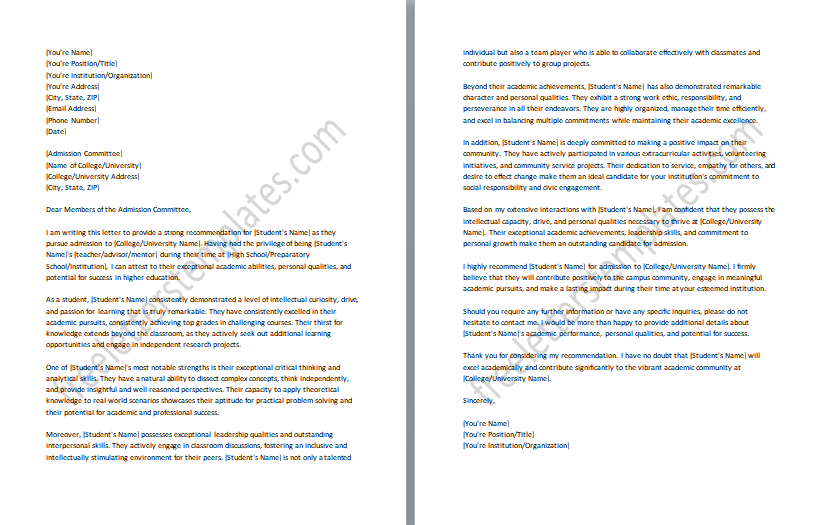
#6: Rental Reference Letter:
A Rental Reference Letter is a valuable document that confirms a tenant’s responsible behavior, payment history, and overall suitability as a renter. It outlines their track record of timely rental payments, cleanliness and maintenance of the premises, and respectful interaction with neighbors. The Rental aims to assist prospective landlords in evaluating the tenant’s credibility and trustworthiness, helping them make informed decisions during the rental application process. A well-crafted Rental can significantly enhance the tenant’s chances of securing a desirable rental property by instilling confidence in their ability to be responsible and dependable tenants.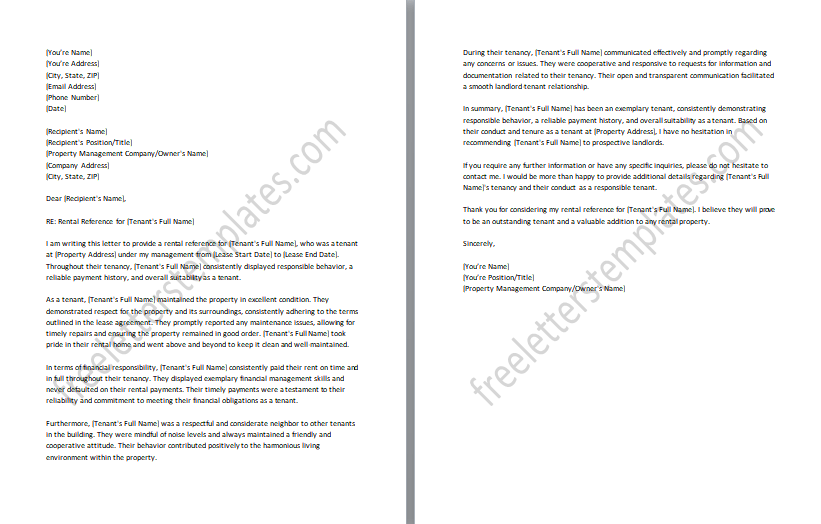
#7: Immigration Reference Letter:
An Immigration Reference Letter is a heartfelt document written to support someone’s immigration application by highlighting their positive qualities, contributions, and impact on the community. It provides insights into the applicant’s integrity, moral values, work ethic, and commitment to their community. The Immigration aims to demonstrate to immigration authorities the applicant’s worthiness, the potential for success, and positive impact on the destination country. A well-crafted Immigration can significantly strengthen an individual’s immigration case by showcasing their genuine character, contributions, and ability to integrate into the new society.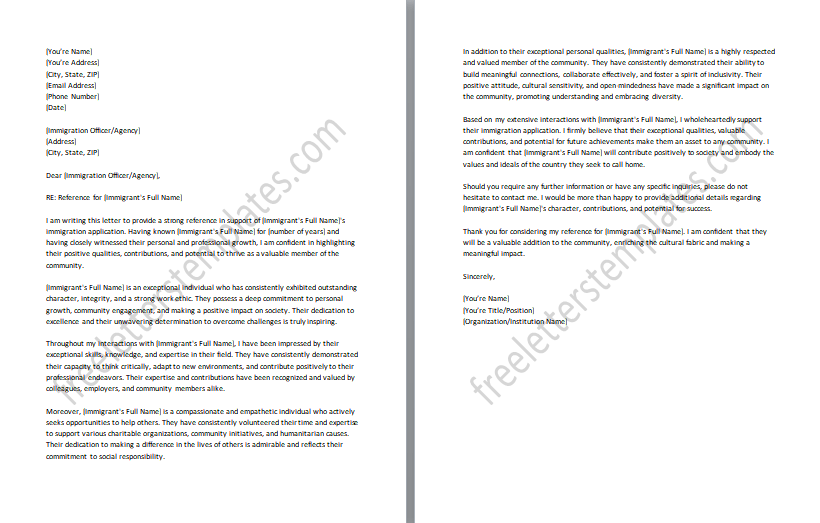
#8: Adoption Reference Letter:
An Adoption Reference Letter carries immense importance as it serves as a heartfelt endorsement for a couple or individual seeking to adopt a child. This passionately speaks to the character, nurturing abilities, and suitability of the adoptive parent to embrace the incredible responsibility of raising a child. It beautifully portrays their unwavering love, dedication, and their unyielding commitment to providing a stable and loving home. The Adoption seeks to assure adoption agencies, social workers, and birth parents that the prospective adoptive parent possesses the essential qualities, values, and a strong support system needed to create a nurturing and joyful environment for the child.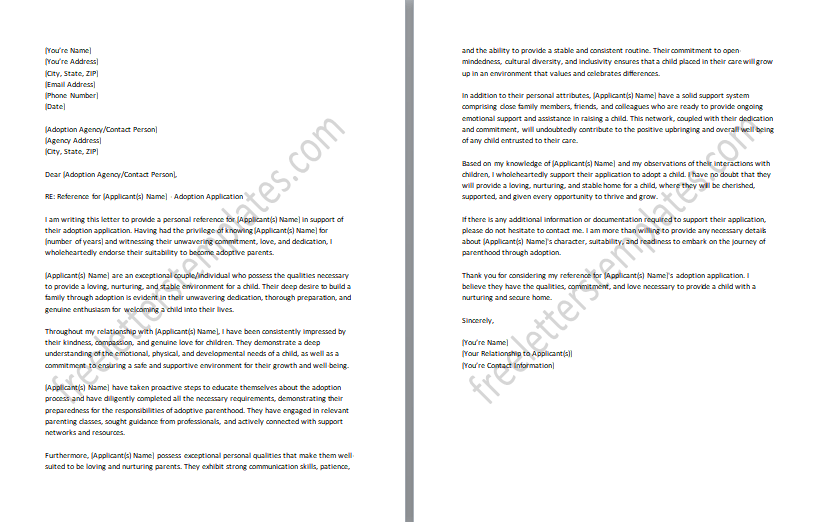
#9: Child Custody Reference Letter:
A Child Custody Reference Letter holds deep significance as it provides crucial information about a person’s ability to care for and provide a stable environment for a child during a custody dispute. It offers insights into the person’s love, dedication, and nurturing capabilities, highlighting their commitment to the child’s well-being and best interests. Child Custody aims to provide an unbiased perspective to the court or relevant legal authorities, shedding light on the individual’s parenting qualities, emotional connection with the child, and ability to provide a safe and supportive environment. A thoughtfully crafted Child Custody can play a pivotal role in custody proceedings by providing valuable information and influencing decisions that will shape the child’s future.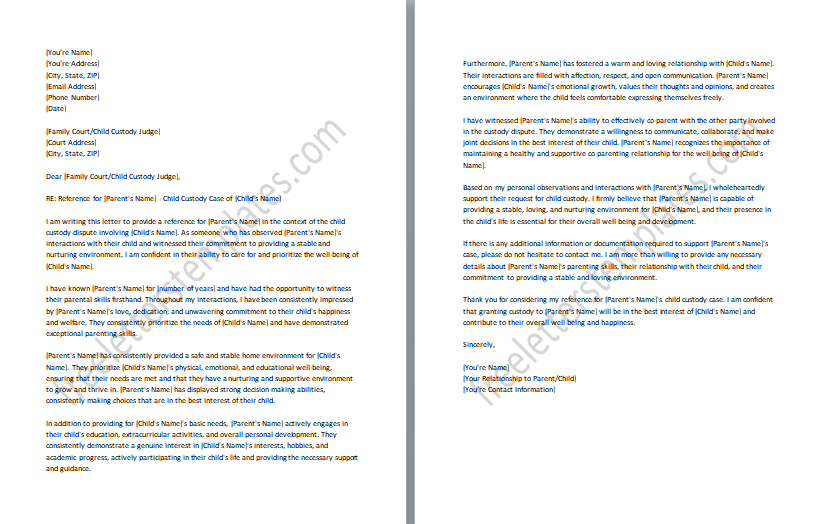
#10: Professional Reference Letter:
A Professional Reference Letter holds significant value as it provides a recommendation for an individual’s professional skills, achievements, and qualifications for a specific job or promotion. Usually written by a former employer, supervisor, or colleague who has firsthand knowledge of the individual’s work performance, this serves as a genuine endorsement. It highlights the person’s expertise, work ethic, and their ability to contribute effectively to the workplace. The Professional aims to offer valuable insights into the individual’s professional strengths, accomplishments, and positive impact on the team or organization. A well-crafted Professional can significantly enhance the individual’s credibility and increase their chances of securing the desired job or promotion.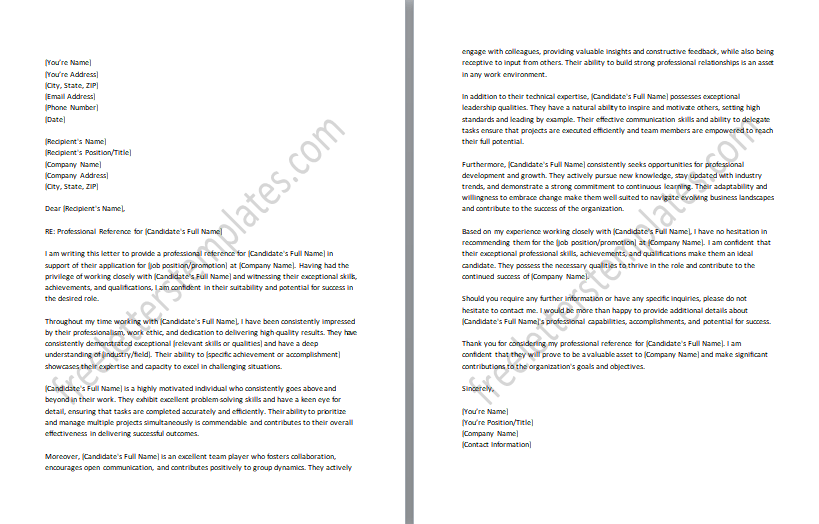
#11: Character Witness Letter:
A Character Witness Letter carries immense weight as it is written by someone who has personally witnessed a person’s behavior or actions and can testify to their character in a legal context. This serves as a heartfelt testament to the individual’s integrity, moral values, and overall character. The Character Witness aims to offer a genuine perspective to the court or relevant legal authorities, helping them make informed decisions. It plays a pivotal role in influencing judgments, as it provides valuable firsthand accounts of the person’s character and can significantly impact the outcome of legal proceedings. A well-crafted Character Witness can serve as a powerful voice in support of the individual’s character and may be instrumental in their pursuit of justice.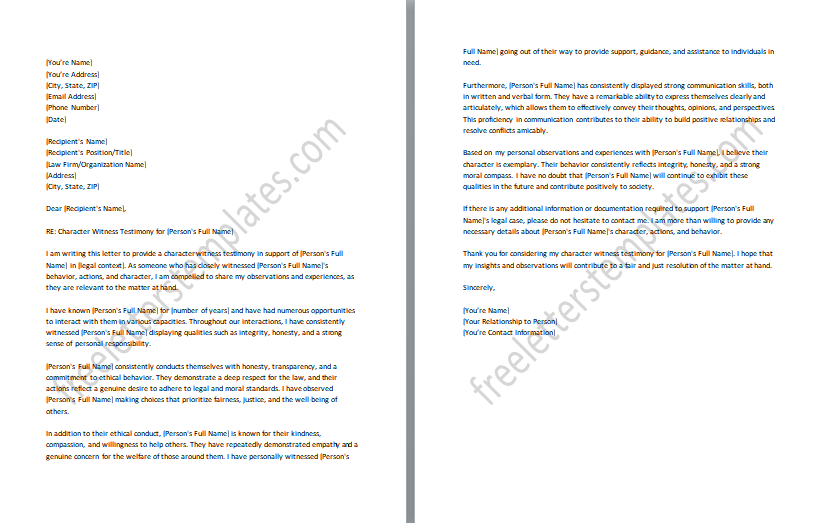
#12: Personal Reference for a Loan:
A Personal Reference for a Loan is a critical document that supports an individual’s application for a loan by verifying their financial responsibility and trustworthiness. It highlights their history of responsible financial management, prompt repayment of debts, and overall financial stability. The Personal for a Loan aims to assure lenders of the applicant’s creditworthiness and their commitment to honoring the loan agreement. A well-crafted Personal for a Loan can significantly strengthen the applicant’s loan application by instilling confidence in their financial integrity and increasing the likelihood of loan approval.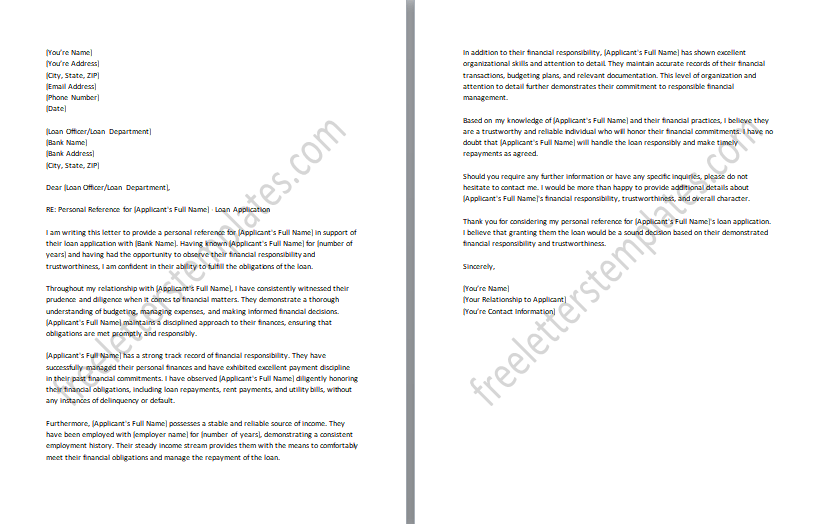
#13: Graduate School Reference Letter:
A Graduate School Reference Letter plays a vital role in evaluating a student’s academic performance, research potential, and suitability for graduate studies. Typically written by a professor, mentor, or academic advisor who has closely worked with the student, this provides an insightful evaluation of their intellectual capabilities, passion for learning, and research skills. The Graduate School aims to provide admissions committees with a comprehensive understanding of the student’s academic abilities, research experience, and potential for success in graduate studies. It serves as a powerful endorsement, helping the student stand out among other applicants and increasing their chances of gaining admission to their desired graduate program.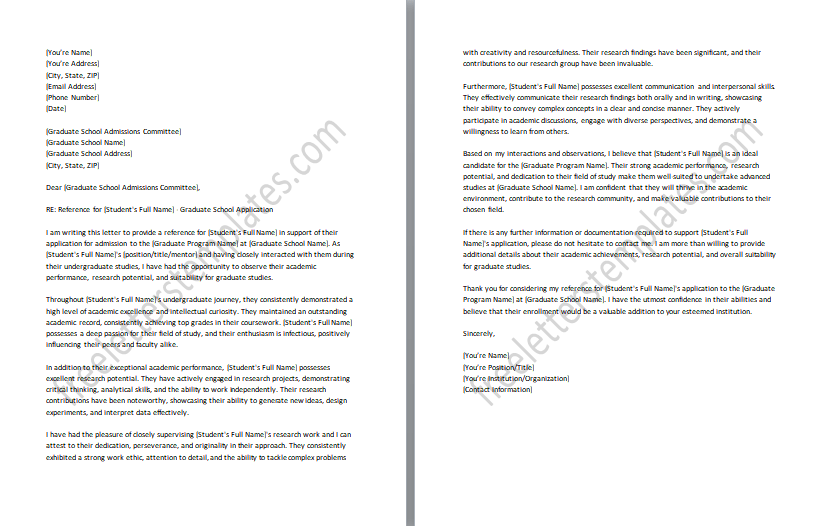
#14: Military Service Reference Letter:
A Military Service Reference Letter holds significant importance as it provides a personal recommendation for someone applying to join the military or seeking a promotion within the military. Typically written by a superior officer, colleague, or someone who has served alongside the individual, this reflects their dedication, professionalism, and exceptional qualities as a service member. It highlights their leadership skills, teamwork, discipline, and their unwavering commitment to serving their country. The Military Service aims to showcase the individual’s capabilities, character, and ability to excel in military operations. A well-crafted Military Service can significantly impact the individual’s military career by reinforcing their positive reputation and enhancing their opportunities for advancement within the military hierarchy.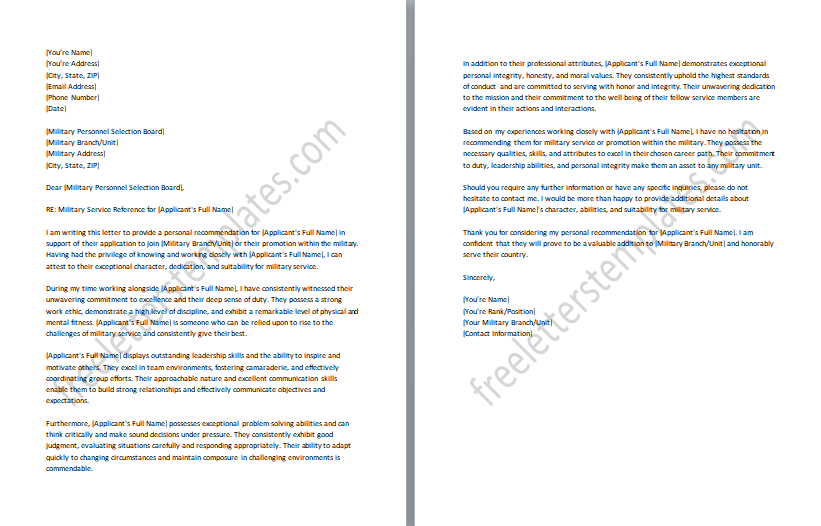
#15: Club or Organization Membership Reference Letter:
A Club or Organization Membership Reference Letter serves as a valuable recommendation endorsing an individual’s membership in a specific club, organization, or professional association. Typically written by a current member, leader, or mentor within the club or organization, this highlights the person’s qualifications, dedication, and potential contributions. It emphasizes their active participation, involvement, and positive impact within the group. The Club or Organization Membership aims to showcase the individual’s passion for the club’s mission, their ability to collaborate effectively with others, and their potential to make meaningful contributions. A well-crafted Club or Organization Membership can greatly enhance the individual’s chances of gaining membership and solidify their position as a valuable member of the community.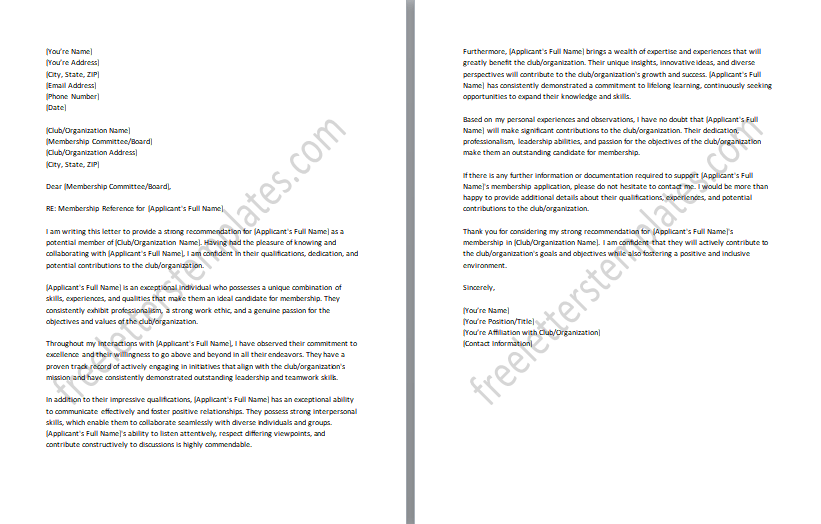
#16: Professional Networking Reference Letter:
A Professional Networking Reference Letter is a powerful tool that helps someone establish professional connections and secure partnerships within their industry. It is usually written by a respected colleague, industry expert, or mentor who has witnessed the person’s professional growth and achievements. This showcases the individual’s expertise, reputation, and ability to collaborate effectively. It highlights their strong work ethic, integrity, and their commitment to fostering mutually beneficial relationships. Professional Networking aims to vouch for the person’s credibility, reliability, and value as a professional connection. A well-crafted Professional Networking can significantly enhance the person’s professional network, open doors to new ventures, and contribute to their long-term success in the industry.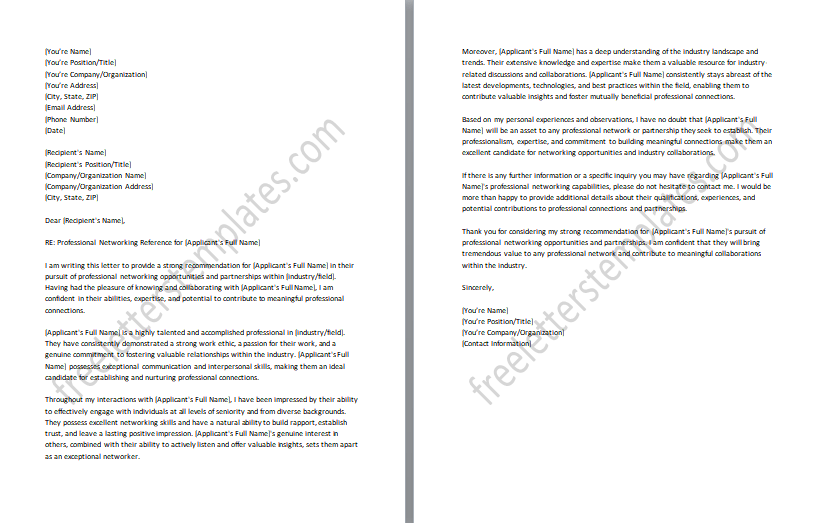
#17: Scholarship Reference Letter:
A Scholarship Reference Letter holds immense significance as it endorses a student’s qualifications, achievements, and potential for receiving a scholarship. It highlights their academic excellence, intellectual curiosity, leadership skills, and involvement in extracurricular activities. The Scholarship aims to present a compelling case for the student’s deservingness of financial support, showcasing their dedication, passion, and potential for future success. A well-crafted Scholarship can greatly enhance the student’s chances of securing a scholarship, enabling them to pursue their educational aspirations and fulfill their academic potential.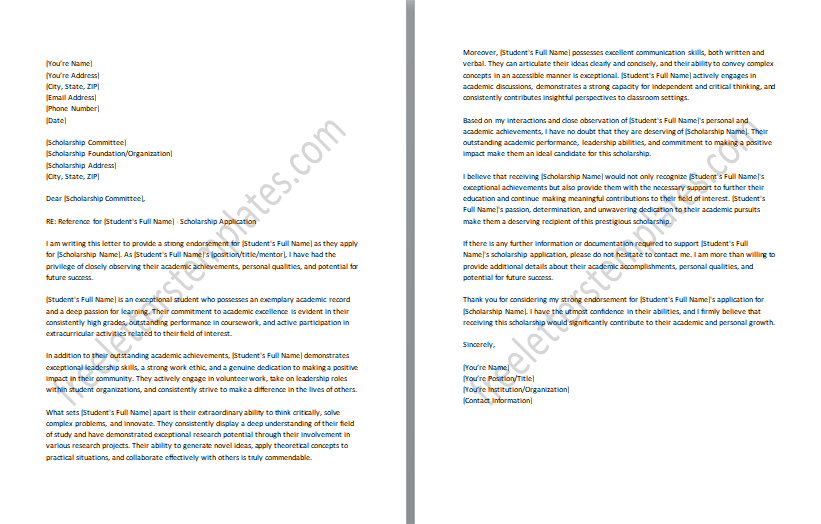
#18: Personal Reference for a Friend:
A Personal Reference for a Friend is a heartfelt letter of recommendation that vouches for a friend’s personal qualities, reliability, and trustworthiness. This highlights the friend’s character, integrity, and positive impact on others. It reflects their loyalty, kindness, and their ability to be supportive in both good times and challenging situations. The Personal for a Friend aims to provide a genuine perspective on the friend’s personality, values, and ability to maintain strong relationships. It serves as a testament to their virtues and can be used in various contexts, such as job applications, housing rental applications, or personal endeavors where character is required. A well-crafted Personal for a Friend strengthens the friend’s reputation, validates their personal qualities, and helps them navigate different aspects of life with confidence.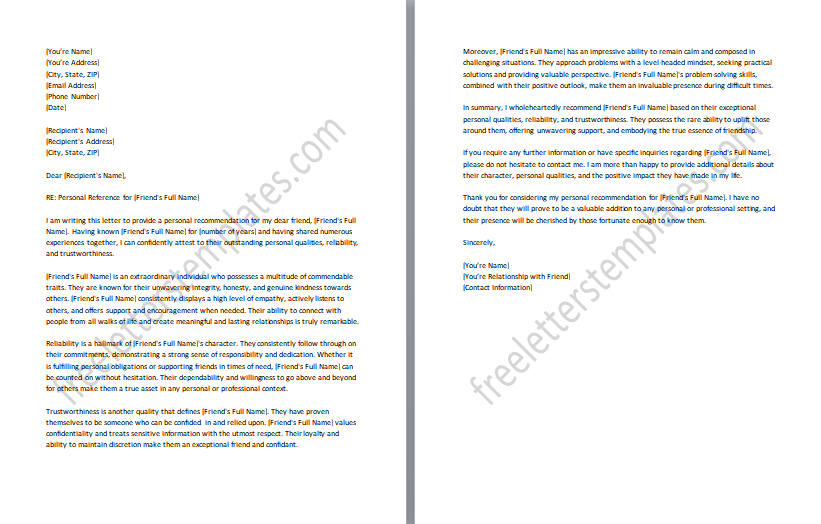
Dos and Don’ts of Personal Reference Letters
Dos:
- Do consider your relationship: Write or request a reference letter from someone who knows you well and can provide genuine insight into your character, skills, and qualifications.
- Do request permission: Always ask for permission before using someone as a reference. Respect their decision if they decline, as it’s important to have willing and supportive.
- To provide the necessary information: If you’re requesting a reference letter, provide the person with relevant information, such as your resume, accomplishments, and the specific purpose or opportunity for which the letter is needed. This will help them tailor the accordingly.
- Do maintain professionalism: Ensure that the reference letter maintains a professional tone and language. It should be concise, focused, and free of any personal biases or irrelevant information.
- Do be specific: Provide specific examples and anecdotes that illustrate the qualities, skills, and achievements of the person being recommended. Specificity adds credibility and helps the reader understand the person’s strengths better.
- Do proofread and edit: Before submitting or sending the reference, carefully proofread it for any errors or inconsistencies. Ensure that the letter is well-structured, coherent, and free of grammatical or spelling mistakes.
- Do respect confidentiality: Maintain the confidentiality of any sensitive or private information shared by the person being recommended. Avoid including confidential or personal details in the reference letter unless explicitly approved by the person.
Don’ts:
- Don’t exaggerate or provide false information: Be honest and accurate in your assessment of the person’s abilities and qualifications. Exaggeration or providing false information can damage your credibility and the reputation of the person being recommended.
- Don’t use a generic template: Avoid using generic reference letter templates. Each reference letter should be customized and tailored to the individual and the specific purpose. Generic lack authenticity and may not effectively showcase the person’s unique qualities.
- Don’t include irrelevant information: Focus on including information that is relevant to the purpose of the reference letter. Avoid including irrelevant personal details or unrelated experiences that do not contribute to the person’s qualifications.
- Don’t rush the process: Allow sufficient time for the person writing letter to gather their thoughts, reflect on their experiences with you, and craft a well-written. Rushing the process may result in a less impactful or poorly constructed letter.
- Don’t forget to follow up: If you’re requesting a reference, express gratitude for the person’s time and effort. Once the letter has been sent or submitted, follow up with a thank-you note to show your appreciation for their support.
Requesting a Personal Reference Letter
- Choose the right person: Select someone who knows you well and can speak positively about your character, skills, and qualifications. Consider individuals who have observed your work ethic, achievements, or personal growth.
- Request in advance: Give the person ample time to write the reference letter. It’s courteous to provide a notice of at least a few weeks, especially if they have a busy schedule.
- Personalized request: Reach out to the person directly and explain why you value their opinion and believe they are the best fit to provide a for you. Customize your request to highlight the specific qualities or experiences you would like them to mention.
- Provide necessary information: To make it easier for the person writing the reference , provide them with relevant information about yourself, such as your resume, accomplishments, and the specific opportunity or purpose for which the is needed. This helps them tailor to your specific needs.
- Be clear and specific: Clearly communicate the deadline by which you need the letter. Provide any guidelines or requirements provided by the recipient of the document, such as the preferred format or addressing specific points.
- Express gratitude: Show appreciation for their time and effort in writing the letter. Let them know how valuable their support is to you and how their recommendation can make a difference in your pursuits. A sincere thank-you note or a small token of appreciation can go a long way.
- Follow up and stay updated: Once the person has agreed to write the reference, stay in touch and provide updates on the outcome or progress of your application or endeavor. Keep them informed so they can provide any additional support if needed.
Conclusion:
In conclusion, our website Personal Reference Letters is your trusted companion when it comes to crafting powerful and effective letters. We understand that writing a can be a daunting task, and that’s why we’re here to help. From providing step-by-step guides on writing personalized and persuasive to offering customized services tailored to your specific needs, we strive to make the process easier and more successful for you. Whether you’re seeking a job, applying for a scholarship, or facing a legal situation, our resources, and expertise will assist you in creating that truly showcase your strengths and qualifications. Trust us to be your guide, and let us help you make a positive and lasting impact with your reference. Begin your journey with “Personal Reference Letters” today and unlock the potential to open doors and achieve your goals.